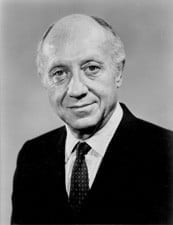Among the American general public, the United States Congress is commonly found to have a poor reputation, stereotyped as inefficient and known for perpetual gridlock and dysfunctional legislation. Most of these perceptions are propagated by interest groups and the media, passed along to citizens with little or no first hand experience with daily life on the Hill. Yet, the very structure of the U.S. government—separation into three distinct branches with a system of checks and balances—naturally fuels occasional internal friction. When it comes to foreign policy, this plays out most notably between Congress and agencies in the Executive Branch, such as the State Department.
Even within the federal government, those working outside of Congress may come to see it as “the enemy”—a group of demanding individuals posing frequent obstacles to agency goals. James Fox of USAID spent one year working for Senator Jacob Javits, the ranking Republican on the Senate Foreign Relations Committee. His experiences changed his perception of Congress, serving as a great learning experience for his future postings and interactions with the Legislative Branch. During his career, Fox also worked in Costa Rica, Uruguay, Colombia, and other places in Washington D.C.
James Fox’s interview was conducted by W. Haven North on June 16, 1999.
Read James Fox’s full oral history HERE.
Drafted by Ashley Young
Excerpts:
“I worked on… foreign aid, the North-South Dialogue, and AID appropriation.”
Early Assignments with Senator Javits: [It] was early 1980 that I actually moved up to the Hill. This was working for Senator Jacob Javits, who was the ranking Republican on the Senate Foreign Relations Committee. I worked on the same kinds of issues I’d worked on at Treasury: foreign aid, the North-South Dialogue, and AID appropriation….
Senator Javits was a very liberal Republican, a strong believer in foreign aid and in working however one could to promote economic and social development in poor countries. He had been responsible for a whole variety of initiatives that various administrations had taken…. I worked on a foreign aid bill, on some initiatives for refugees and I remember taking a trip to Somalia and Sudan looking at refugees and trying to find out whether the UN system had fallen down on its job in terms of feeding refugees…. The question was whether or not there was a problem with Somali refugees from Ethiopia after the Ogaden War in 1977- 78. But basically it was not the UN’s fault. They had responded in a very timely fashion. It was the Somalis fault for several months for understating the problem and refusing to level with the UN about how serious their refugee problem was and how serious starvation was occurring in their refugee camps.
“The view from the Hill is entirely different…. I came to understand that life is more complicated than I had thought.”
A Change of Perspective: Q: [Were] there other issues?
FOX: Actually, it was more firefighting, doing a lot of day to day issues…. I do recall we had extensive negotiations. We were doing a foreign aid reauthorization which ultimately was never passed, but any time the foreign aid bill is reauthorized there may be a hundred amendments to the bill. The House on most or all of these will have a different take than the Senate. It’s not a question of first of all how to deal with those provisions on the floor of the Senate; whether to oppose or support or amend was the first question and we did lots of papers on various of these issues. The staff has a substantial role in preparation for the conference committee where House and Senate bills are to be reconciled. I remember a lot of negotiations with our colleagues from the House. I should mention that I was working for the Republican staff of the committee. The Democrats were in the majority and so our role was more kibitzers than anything else. Javits’ orientation toward foreign aid was to be very bipartisan and largely to be on the same side as the Democrats’ issues. One thing from my Hill experience that was most amazing to me was how my perception of the Executive Branch and AID changed during that period. Working in AID or the Treasury I had always come to see the Hill, the Congress, as the enemy. As people who were always passing arbitrary provisions, throwing their weight around, pushing these poor almost defenseless agencies around. The view from the Hill is entirely different. On the Hill one perceives these agencies as organizations who can ignore the Congress with impunity, who can lie to the Congress and do it regularly. But, for the most part to simply ignore the real concerns of Congressmen and Senators and who give short shrift to their serious questions, their desire for answers. So I came to understand that life is more complicated than I had thought. I think some of what we who were working in the Executive Branch perceive as Congressional meddling when they pass a provision requiring AID to report on something. On the Hill that is seen as more of an act of frustration. They are unable to get the Executive Branch to respond in any other way and so requiring a report or demanding something is just a way of getting something back. In some cases it is not the problem of AID or the Treasury; in some cases it’s the White House that tells the agency things that it cannot do when dealing with Hill that impedes real communication. But in general, I came to have a much higher respect for the Congress.
Q: Was there a lot of earmarking?
FOX: Some. The Executive Branch always would say they were opposed to earmarks, but there was a lot of horse trading and negotiation about who should get what and eventually usually an understanding between Congress and the Executive Branch on how the money should be spent.
“I do see the Congress as representative. It may not be logical and it may not be consistent… but it is representative of the people.”
The People’s House: Q: How did you view the legislative process with the House and the Senate?
FOX: Well, I saw it was certainly a difficult process, but one that I think the American people ought to be pleased with. I do see the Congress as representative. It may not be logical and it may not be consistent, it may not always have a long term view of things, but it is representative of the people. The people in the Congress are always concerned about what their constituents believe, trying to if not absolutely representing or parroting the views of their constituents. They are trying to act in ways that take very strong account of the beliefs of their constituents.
Q: Were you subjected to a lot of lobbying from outside interest groups?
FOX: Because we were in the minority we were subject to far less than the people in the majority. I would say during our period non-governmental organizations were the lobbyists of greatest importance: religious groups, human rights groups, and others concerned with foreign aid. Now, individually Congressmen or Senators would be lobbied by institutions in their own State or District ranging from universities to private companies, ones that expected some business from AID, but those activities were seldom seen by the committee staff. They were handled individually by members.
“Congress… deferred to the Executive Branch in most cases on foreign policy, including foreign aid.”
The Public and Executive—Determinants of Policy: Q: What was your sense of what the public thought about foreign aid at that time?
FOX: If you read the opinion polls the public was generally skeptical or negative about foreign aid. They thought we spent too much on foreign aid and they thought we wasted too much of what we spent, but foreign aid was seldom an important issue in the sense that it determined whether or not Congressmen or Senators got reelected. It was not a core issue for constituents and therefore members of Congress could vote their conscience or, frankly, it seemed to me the way the system worked was that they deferred to the Executive Branch in most cases on foreign policy, including foreign aid. If the Executive Branch was convinced that more foreign aid was needed Congress would respond. If the Executive couldn’t be convinced they wouldn’t get more money. The year after I left the Hill substantially more foreign aid was voted because the Reagan Administration made a strong case particularly for Latin America and for other areas of the world where the U.S. had strategic concern. So Congress was willing to vote a considerable increase in foreign aid. So it really depends on the foreign policy case that the Executive Branch makes.
Q: Any more on your experience with the Congress?
FOX: No, as I say I found it a fascinating learning experience.
TABLE OF CONTENTS HIGHLIGHTS
Education
BA in Engineering, University of Notre Dame 1962–1966
Ph.D in Economics, University of North Carolina at Chapel Hill 1966–1970
Joined the Foreign Service 1970
Bogotá, Colombia—Economist 1973–1976
Washington, D.C.—USAID Development Studies Program 1976–1977
Washington, D.C.—Assistant to Senator Javits, Senate Foreign Relations Committee 1980–1981
Washington, D.C.—Staff Assistant to Undersecretary of State for Economic Affairs 1981–1982


